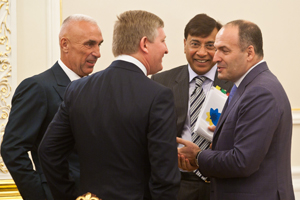What makes investors sad?
Potential foreign inland investors complain about record tax burden, with domestic ones keeping silent
Business people met with President Viktor Yanukovych of Ukraine on June 7 to discuss private domestic and foreign sector’s interest. Traditionally, the meeting was attended by the CEOs of Ukraine’s major companies and foreign counterparts. As last years, there were no opposition oligarchs like Ihor Kolomoisky and Kostiantyn Zhevaho. There were VIPs representing MacDonald’s, ArcelorMittal, Nestle, Trump Group, Sberbank (Russia), VTB Bank, etc. A total of 30 VIPs, with big-time businessmen started by holding lobby talks around 10 a.m. They would later say, off the record, that they wanted to figure out the situation. The sitting began at 11 a.m. Those present spoke in front of TV cameras about their problems and how business could be made in Ukraine. The overall impression was that this meeting was a remake of last year’s one, with foreign investors holding the floor while the domestic billionaires mostly kept silent, save for brief public appearances avoiding the tax, customs duty, and corruption themes that are the most sensitive topics on Ukraine’s business agenda.
According to President Yanukovych, the domestic economic situation is improving, with corruption being on a downward curve, with VAT refunds being on an upward curve; with every effort being made to allow domestic business to make progress while awaiting concessions from the European Union. “I am expecting [good will] in terms of the environment, health care; efforts aimed at upgrading the health care network, building modern health care centers,” said Yanukovych.
Vadim Novinsky, CEO, Smart Holding Co. (granted Ukrainian citizenship a week ago) believes that business needs a judiciary reform: “Without an independent, unbiased judicial system there will be no attractive foreign inland investment climate in Ukraine. Under the circumstances, business people can protect their investments and property only in courts of law.” He adds that there should be a transparent and stable national economic policy. Last but not least, there should be government officials authorized to protect the businessmen’s interests.
Dmytro Firtash, chairman of the board, DF Group, believes that the main task for the current administration is to help the small and middle businesses in Ukraine, considering that they make up a mere 12-15 percent of the GDP, compared to some 50 percent in the developed countries. Firtash is convinced that uniform procedures should be created, taking into account the human factor, lending a helping hand to the businessmen at the start of their career. Firtash believes that such measures will help Ukraine’s economic growth, with the emphasis on machine-building.
Oleksandr Yaroslavsky, CEO, Development Construction Holding, told The Day he had wanted to share his ideas with the president of Ukraine, but that the meeting with the head of state never let him do so. He said that Ukraine’s foreign inland climate was normal and that he planned to increase his investments: “I’m working the way I always did.” He adds that his investments will depend on the outcome of Euro-2012, considering that he has paid a lot for the building of the [soccer championships] infrastructure, stressing that he has paid the taxes, but not a cent as bribe.
Tomas Fiala, CEO of Dragon Capital and President of the EBA, says the investment climate in Ukraine won’t improve: “The situation isn’t likely to change for the better during this year...” He refers to domestic as well as foreign political reasons, focusing on rampant corruption, the absence of the rule of law, tax burden, unfair privatization campaign, strained relationships with the IMF and EU, including the drawn-out Association Agreement/FTA proceedings, and the bad terms of Ukraine’s agreement with Russia’s Gazprom.
What makes the difference between the domestic and foreign investors’ views on Ukraine? Perhaps because the foreign investors are accustomed to doing business in accordance with the law, while their Ukrainian counterparts know that all problems can be solved backstage, with envelopes with greenbacks quietly changing hands. What we need is a transparent public mechanism geared to solve such business problems, otherwise Ukraine will rank with the world’s most corrupt and overtaxed countries.






